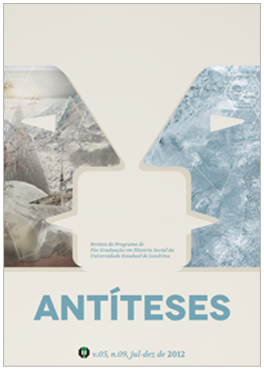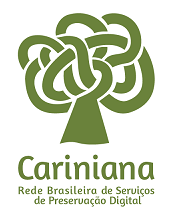Forming Historical Consciousness - Towards a Humanistic History Didactics
DOI:
https://doi.org/10.5433/1984-3356.2012v5n10p519Palabras clave:
History didactics, Historical consciousness, Historical cultureResumen
This paper present some reflexions between History Didactics and a new concept of Humanism. It shows among other questions the challenges of nowadays historical culture, which come from the growth of the interculturality and communication in all dimensions of pratical human life. To develop the argumentation it has been necessary to clarify some categories like History Didactics, Historical consciousness, Historical culture, Historical learning and Humanism. Moreover, to answer the challenges, one has developed the idea of a new humanism and its implications for historical learning. The paper also discutes how to learn Universal History means the understanding that the unity of historical time within the diversity of historical experience and how it could be a contribution for people to learn to be human.Descargas
Citas
ANTWEILER, Christoph. Menschliche Universalien. Kultur, Kulturen und die Einheit der Menschheit. Darmstadt: Wiss. Buchgesellschaft, 2007.
ARNASON, Johann P.; EISENSTADT, S.N.; WITTROCK, Björn (ed.). Axial Civilisations and World History. Leiden: Brill, 2005.
BURKE, Peter. The spread of italian humanism. In: GOODMAN, Anthony; MACKAY, Angus (ed.). The impact of humanism on Western Europe. London: Longman, 1990. p. 1-20
CAJANI, Luigi. A World History Curriculum for the Italian School. World History Bulletin, Fall, v. XVIII, n. 2, p. 26-32, 2002.
CANCIK, Hubert. Humanismus. In: CANCIK, Hubert; GLADIGOW, Burkhard; KOHL, Karl-Heinz (ed.). Handbuch religionswissenschaftlicher Grundbegriffe. Bd. III. Stuttgart: Kohlhammer, 1993. p. 173-185.
CANCIK, Hubert; VÖHLER, Martin (ed.). Humanismus und Antikerezeption im 18. Jahrhundert (Fn. 6); its French form is described by Todorov, Tzvetan: Imperfect garden. The legacy of humanism. Princeton: Princeton University Press, 2002.
D'HAENENS, Albert. Oralité, Scribalité, Electronalité. La scribalité occidental depuis le moyen age. Louvain-laNeuve, 1987.
EISENSTADT, Shmuel Noah (ed.). The Origins and diversity of axial age civilizations. Albany: State University of New York Press, 1986.
EISENSTADT, Shmuel Noah. Multiple Modernities. Daedalus Winter, v. 129, n. 1, p. 1-30, 2000.
FERRY, Luc; RENAULT, Alain. Antihumanistisches Denken. Gegen die französischen Meisterphilosophen [orig.: La pensée 68. Essai sur l'anti-humanisme contemporain, Paris: Gallimard, 1985], München: Hanser, 1987.
GIUSTINIANI, Vito R. Homo, humanus, and the message of 'Humanism'. Journal of the History of Ideas, v. 46, n. 2, p. 167-195, 1985.
GÖSSMANN, Elisabeth (ed.). Ob die Weiber Menschen seyn, oder nicht? München: Iudicium, 1988.
HERDER, Johann Gottfried. Briefe zur Beförderung der Humanität. Berlin, Weimar: Aufbau, 1971. 2 v.
HERDER, Johann Gottfried. Reflexions on the Philosophy of the History of Mankind, transl. F.E. Manuel London, 1986.
HERDER, Johann Gottfried. Werke, ed. Wolfgang Pross, Bd. III in 2 vols: Ideen zur Philosophie der Geschichte der Menschheit. Darmstadt: Wissenschaftliche Buchgesellschaft, 2002.
HUMBOLDT, Wilhelm Von. Ãœber den Geist der Menschheit. In: WERKE (ed.). Andreas Flitner und Klaus Giel. Bd. 1: Schriften zur Anthropologie und Geschichte. Darmstadt: Wissenschaftliche Buchgesellschaft, 1960. S. 506-518. (Gesammelte Schriften [Akademie-Ausgabe] II, p. 324-334).
JASPERS, Karl. The Origin and Goal of History. Westport, Conn.: Greenwood Press, 1976.
JASPERS, Karl. Vom Ursprung und Ziel der Geschichte. (at first Zürich 1949). München: Piper, 1963;
KARLSSON, Klas-Göran; ZANDER, Ulf (ed.). Echoes of the Holocaust. Historical cultures in contemporary Europe. Lund: Nordic Academic Press, 2003.
KARLSSON, Klas-Göran; ZANDER, Ulf (ed.). Holocaust Heritage. Inquiries into European Historical Culture. Malmö: Sekel, 2004.
RÜSEN, Jörn. Berättande och förnunft. Historieteoretiska texter. Göteborg: Daidalos, 2004.
RÜSEN, Jörn. Die vier Typen des historischen Erzählens. in: RÜSEN, Jörn. Zeit und Sinn. Strategien historischen Denkens. Frankfurt am Main: Fischer Taschenbuchverlag, 1990. p. 153-230
RÜSEN, Jörn. Historische Orientierung. Über die Arbeit des Geschichtsbewußtseins, sich in der Zeit zurechtzufinden. 2. Aufl. Schwalbach/Taunus: Wochenschau, 2008.
RÜSEN, Jörn. Historisches Lernen. Grundlagen und Paradigmen. 2nd ed. Schwalbach/Taunus: Wochenschau, 2008.
RÜSEN, Jörn. History. Narration - Interpretation - Orientation. New York: Berghahn Books, 2005. p. 9-40;
RÜSEN, Jörn. Humanism and Nature - Some Reflections on a Complex Relationship. The Journal for Transdisciplinary Research in Southern Africa, v. 2, n. 2, p. 265-276, Dec. 2006.
RÜSEN, Jörn. Humanism in response to the Holocaust - destruction or innovation?, Postcolonial Studies, v. 11, n. 2, S. 191-200, June 2008.
RÜSEN, Jörn. Intercultural Humanism: How to Do the Humanities in the Age of Globalization. Taiwan Journal of East Asian Studies, v. 6, n. 2 (Issue 12), p. 1-24, Dec. 2009.
RÜSEN, Jörn. Traditionsprobleme eines zukunftsfähigen Humanismus. In: CANCIK, Hubert; VÖHLER, Martin (ed.). Humanismus und Antikerezeption im 18. Jahrhundert, Bd. 1: Genese und Profil des europäischen Humanismus, Heidelberg: Winter, 2009. p. 201-216;
RÜSEN, Jörn; LAASS, Henner (ed). Humanism in Intercultural Perspective. - Experiences and Expectations. Bielefeld: Transcript, 2009.
STRAUB, Jürgen (ed.). Narration, Identity, and Historical Consciousness. (Making Sense of History, v. 3). New York: Berghahn Books, 2005.
Descargas
Publicado
Cómo citar
Número
Sección
Licencia
Derechos de autor 2012 Antiteses

Esta obra está bajo una licencia internacional Creative Commons Atribución 4.0.
A Revista Antíteses adota a Licença Creative Commons Attribution 4.0 International, portanto, os direitos autorais relativos aos artigos publicados são do(s) autor (es), que cedem à Revista Antíteses o direito de exclusividade de primeira publicação.
Sob essa licença é possível: Compartilhar - copiar e redistribuir o material em qualquer suporte ou formato. Adaptar - remixar, transformar, e criar a partir do material, atribuindo o devido crédito.
https://creativecommons.org/licenses/by/4.0/












